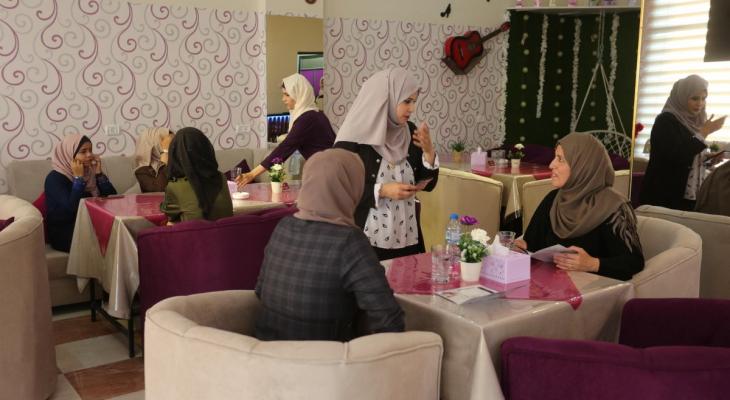Originally published by Ma’an News Agency on November 2, 2013.
Discreetly located at the foot of a staircase, the cafe offers a familiar scene: shisha pipes are stacked neatly on the counter, ashtrays dot each table, Lebanese satellite television plays in the background and steaming Turkish coffee is served to a table of regulars.
Like many other cafes lining the busy avenues branching off of Ramallah’s bustling Manara Square, this is a gendered space. Male employees stand guard outside, surveying the entrance of the cafe with stern eyes.
Unlike most public establishments in Ramallah, Ladies is a cafe for women only.
When the cafe opened in early 2012, it was the first women-only cafe in Ramallah. As in most cities in Palestine, cafes in Ramallah are primarily a men-only affair. Many cafes and restaurants have mixed clientele and some even have delineated “family” sections, but for the most part women rarely frequent cafes on their own.
Ladies promised to provide a different experience, one that barred male clientele and instead offered a public space intended exclusively for women. The hope was that in a society where cafes are traditionally geared towards men, the creation of a women-only cafe would offer women equal access to the public sphere, but on their own terms.
Cafe owner Jamil Ali explains that in a woman-only space, women can feel comfortable and take off their scarves, smoke cigarettes and sit with their legs crossed, unlike in male-dominated cafes where these behaviors might draw attention.
“She doesn’t want anybody to look at her,” he says.
“A thousand eyes will go to her, a thousand eyes.” But in a public space frequented exclusively by women, she is free to unwind in a comfortable setting.
In addition to creating a space accessible to women, Ali also sought to ensure that the cafe be economically accessible to a female-only clientele. As he explained, many mixed cafes charge prices out of reach for most Palestinian women.
Although the entire menu was originally priced at 10 shekels ($3), after realizing that the prices were still too high for some patrons, the price of drinks were lowered to seven shekels ($2).

“Women don’t have to be on their guard.”
Unlike Jamil Ali, Susie Atilla didn’t set out to create a women-only space three years ago when she co-founded Diva, a cafe patronized predominantly by women inconspicuously located off of a main street in Bethlehem.
Atilla was originally encouraged by the male owner of the commercial center where Diva is located to open the cafe there because a number of other female-oriented businesses had locations nearby. Among Diva’s neighbors are a gym, hairdresser and a Turkish bath.
She explains that even though the cafe was open to a mixed clientele, “the reputation spread that it’s only for women.”
“Some men get really embarrassed to come with their wives but we always tell them men and families are welcome!” she adds with a chuckle.
Susie and her sister, Nancy, started Diva as a project meant to provide them with an income for after their retirement from their day jobs. They hoped in the process to create a place where they and their friends could come and socialize.
When asked about Ladies cafe in Ramallah, Atilla smiles.
“It’s great for girls to be able to feel comfortable,” in a cafe like Ladies. “Women don’t have to be on their guard.”
She emphasizes that even though its location is somewhat isolated, Diva offers “privacy,” and a place where women feel comfortable.
The sentiment was shared by many patrons at Ladies interviewed by Ma’an.
A patron from the US uses the cafe as a space for lessons with teenage Palestinian girls she tutors. The parents of the girls, she says, feel comfortable knowing that the cafe only serves women and thus offers a secure public meeting spot for young girls.
Many of the students’ parents usually only allow their daughters to go to school and come home, the tutor says, but when they heard about the cafe they welcomed the idea.
She concedes, however, that gender-segregated cafes “enforce the idea that girls have to do things in secret.”
A Palestinian woman at the cafe adds, “It’s sick, the separation thing. Ramallah is better (than other cities in Palestine, but) you still find people who won’t let their daughters or wives go places.”
This customer tells Ma’an that she sees a women-only cafe as another example of the kinds of separation between genders that persists in Palestinian public space.
She adds that the cafe’s decision to serve an exclusively female clientele furthers the gender divide between men and women in public spaces.
“The society and the mentality of the people is not going to change soon,” she says with a shake of her head.
Creating public spaces for women
Both cafes, though quite different in mission, have become spaces for women located in a larger urban context that offer comfort and privacy for their patrons. Neither cafe set out to change the fabric of Palestinian society, or the fact that most public establishments primarily cater exclusively to men.
Rather, each cafe acknowledges the realities of a male-dominated public sphere by offering a place where women can feel comfortable.
Even though all-women cafes like Ladies “(enforce) the separation,” a Palestinian patron says, they can also be seen as “a solution that make things easier for some part of society.”
And for the many women who frequent Ladies and Diva, but feel uncomfortable or unable to patronize male-dominated establishments, these cafes offer a unique and inviting alternative that offers comfort, privacy, and access.
Atilla, the owner of Diva suggests that “some women in society feel like they need to have a place that is private and that’s where they feel comfortable.